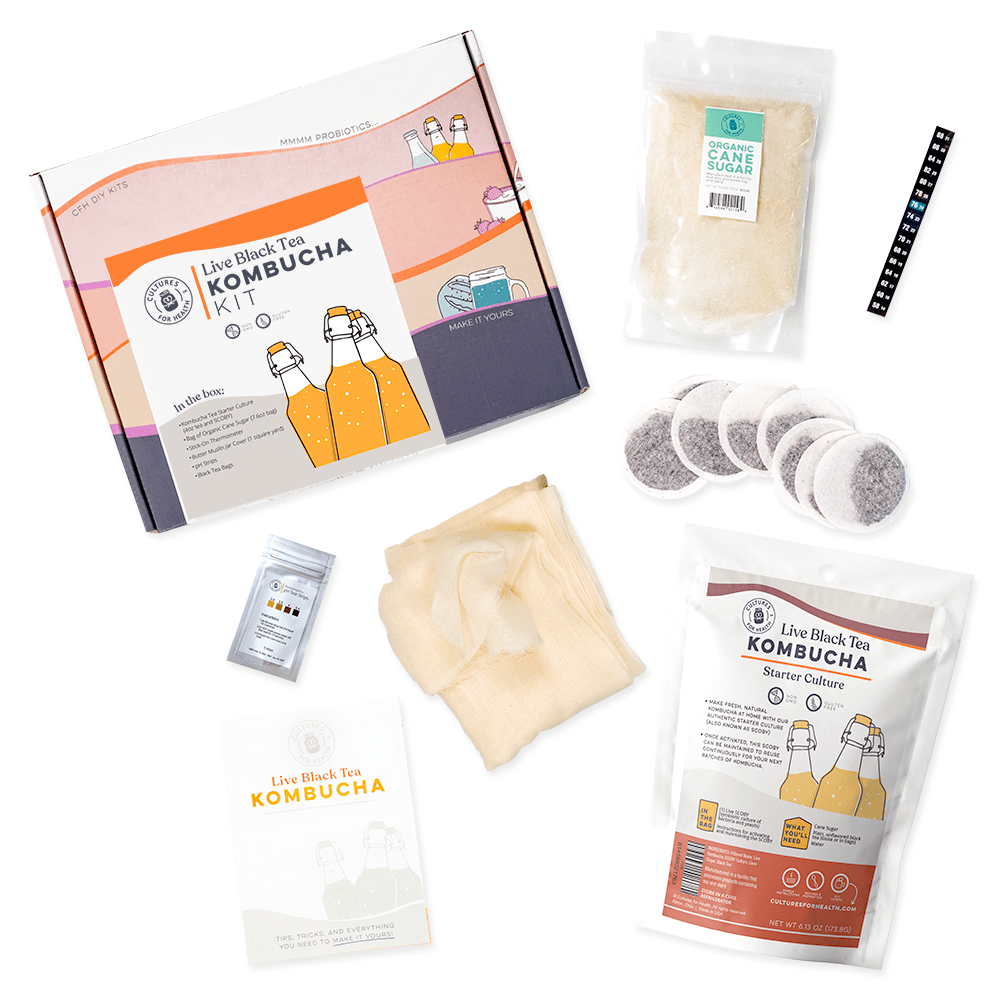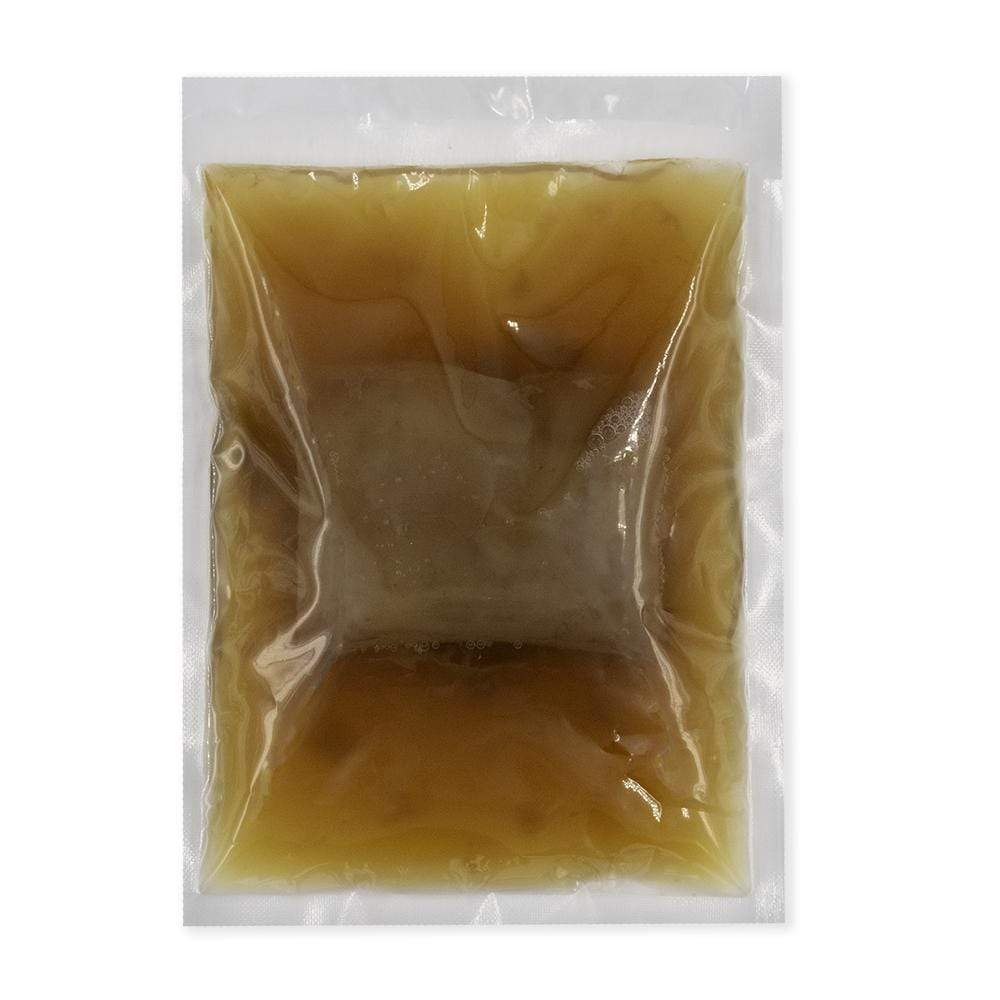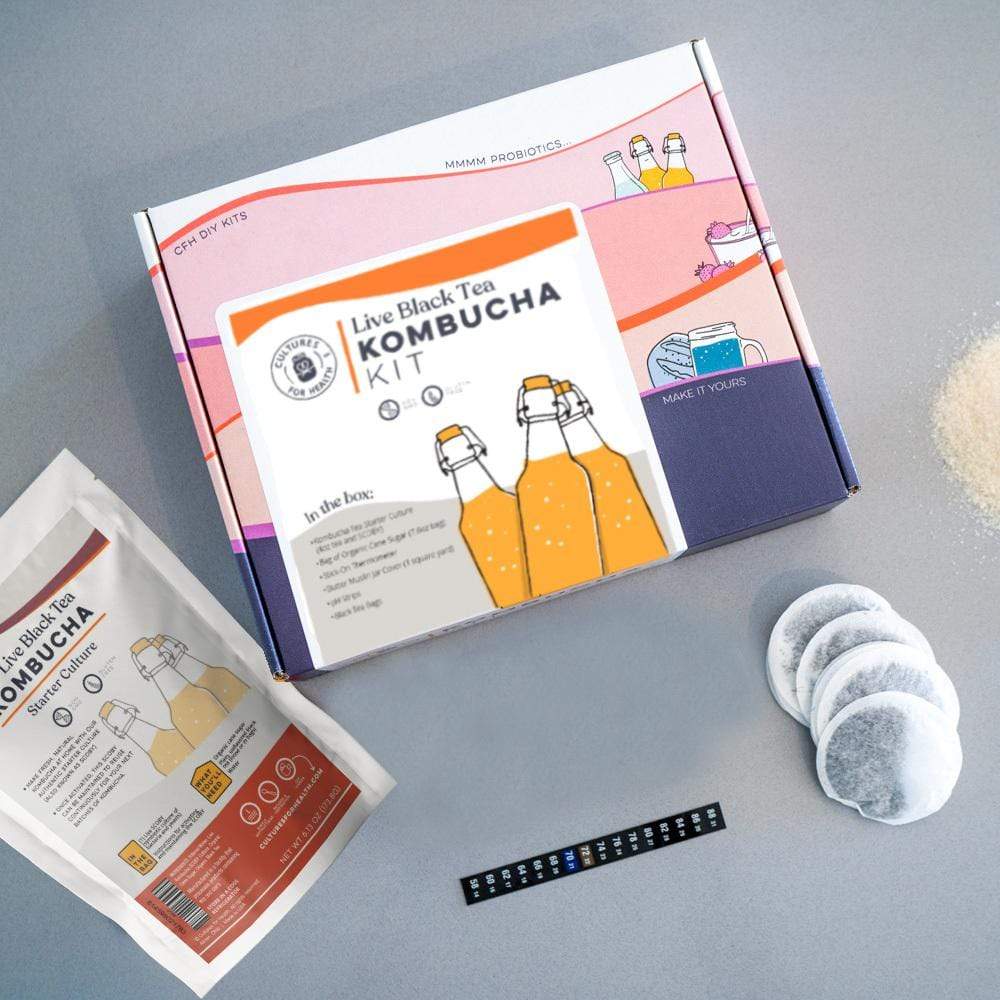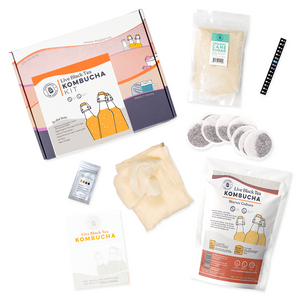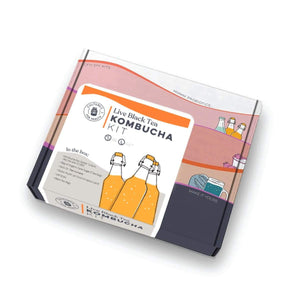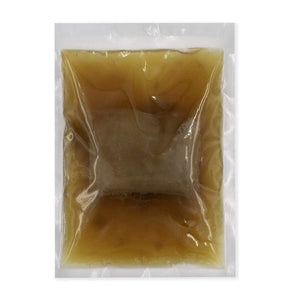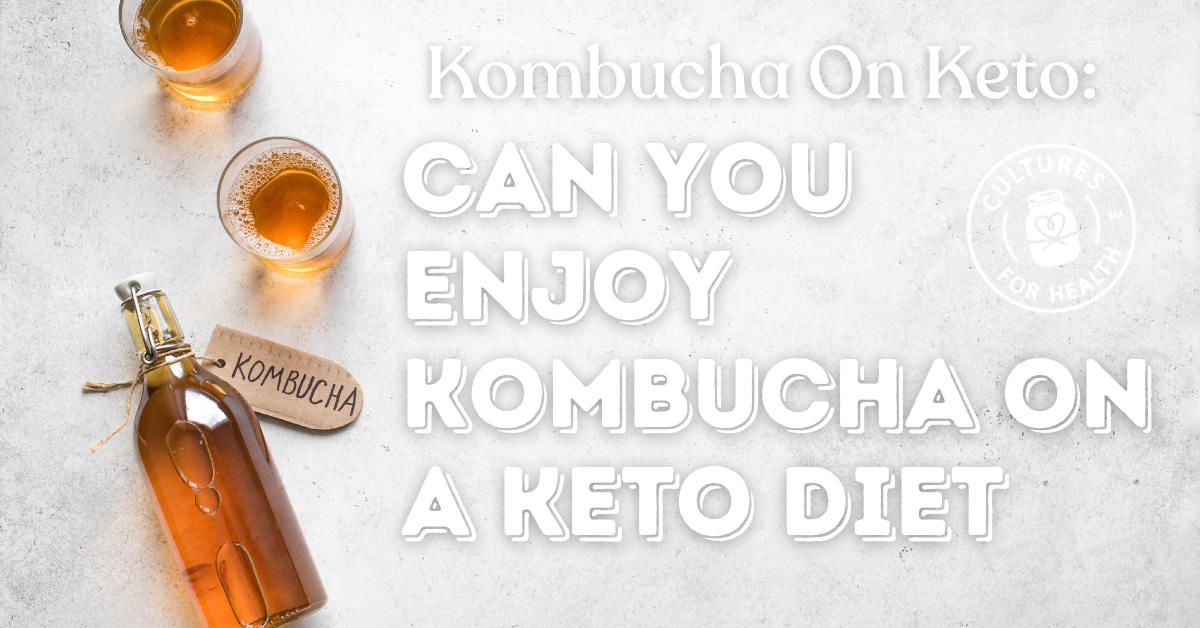
Kombucha is a fermented tea gaining popularity in recent years for its purported health benefits; it owes much of its unique flavor and characteristics to a mysterious component known as a SCOBY. But what is a SCOBY, why is it such an essential component of the kombucha brewing process, and how often should you drink kombucha?
What is a SCOBY?

SCOBY is an acronym for Symbiotic Culture of Bacteria and Yeast, a living culture responsible for converting sweet tea into tangy kombucha. It assumes the form of a rubbery, pancake-shaped substance that is typically beige or brown in color. People also call it the "mother" because it can create new SCOBYs, or "mushroom" because it kinda looks like one. The "mother" nickname is also accurate because it highlights how the SCOBY is an heirloom culture that can be passed down through generations.
The SCOBY itself is made up of a complex mixture of bacteria and yeast, which work in tandem to transform the tea mixture into kombucha. These microorganisms form a distinct gel-like structure that is pivotal to the entire fermentation process. These SCOBYs will often be found floating at the top of brewing kombucha. It is imperative to understand SCOBYs for anyone keen on brewing their own kombucha.
Traditional Uses of a SCOBY in Kombucha
For countless ages, SCOBYs have played a quintessential and indispensable role in the fermentation and creation of kombucha, a fermented tea that traces its roots to ancient China and has now found a global fanbase. The manufacturing process entails brewing tea, the addition of sugar, and then introducing the SCOBY to the mixture. The SCOBY ferments the sugar, generating carbon dioxide, along with other byproducts that coalesce to form a bubbly, tangy, and slightly sour drink.
Despite being a novel discovery in the Western Hemisphere, the practice of consuming kombucha has a long-standing history in traditional Chinese medicine, as its reputed health benefits were known to Chinese herbalists centuries ago. Kombucha is widely considered in Chinese culture as a digestion-enhancing tonic, energy booster, and general health supporter. Its medicinal properties have also led to its use as a remedy for various health issues, spanning from arthritis to cancer.
Beyond its reputed health benefits, kombucha's rich cultural heritage spans diverse regions and centuries. People worldwide have relished this refreshing drink for generations, but its fame has only soared in recent times. Today, an endless variety of kombucha flavors and blends are readily available, ranging from classic black tea to more exotic formulations infused with fruits, herbs, and spices. Whether you are an experienced kombucha aficionado or encountering the drink for the first time, this cherished beverage's distinct and delightful taste is sure to captivate your taste buds.
Live Black Tea Kombucha Starter Kit
Health Benefits of SCOBYs:

SCOBYs are chock full of beneficial bacteria and yeast, making them a powerhouse of probiotics. And when it comes to probiotics, the potential health benefits are wide-ranging and impressive. The examples that follow are only a handful of the health benefits that SCOBYs and kombucha may be able to bring:
-
Improved Digestion
Probiotics like those found in SCOBYs have been shown to support healthy digestion and promote regular bowel movements. They may also help to reduce symptoms of digestive issues like bloating, constipation, and diarrhea.
-
Stronger Immune System
A healthy gut is essential for a healthy immune system, and probiotics are one of the best ways to support gut health. Some studies suggest that consuming probiotics regularly may help to reduce the risk of infections and illnesses by boosting the immune system.
-
Lowered Risk of Chronic Disease
The antioxidants found in kombucha and SCOBYs may help to reduce inflammation and safeguard against long-term illnesses like heart disease, cancer, and diabetes.
-
Mental Health Benefits
The gut-brain connection is real, and there is evidence to suggest that a healthy gut may be linked to better mental well-being. According to several studies, probiotics may be beneficial in reducing symptoms of anxiety and depression.
-
Potential Benefits for Skin Health
Some sources suggest that the probiotics and antioxidants in a kombucha SCOBY can benefit skin health by promoting healthy bacteria on the skin and reducing inflammation.
Although some data suggest that SCOBYs and kombucha may offer health benefits, more research is needed to fully understand these potential benefits and establish the ideal dosage and consumption schedule. Always consult a medical expert before making any decisions or incorporating any new food or supplement into your diet.
Practical Tips on Caring For a SCOBY and Brewing Kombucha

Now that you know what a SCOBY is and its importance in making kombucha, let's explore some practical tips for caring for your SCOBY and brewing your own kombucha.
-
Storage of SCOBYs
If you’ve ordered a kombucha kit and have been brewing your own, but want to take a break, that’s easy enough to do. Just store your live SCOBY in a SCOBY hotel with some kombucha and it can live just fine for weeks—even months. If you need longer term storage, you can dehydrate your SCOBY and keep it somewhere cool and dry.
-
Cleaning of Equipment
Ensure all your equipment is clean and sanitized before brewing. Use hot water and soap to clean all equipment, and then rinse with a solution of water and white vinegar (1:1) to sanitize.
-
Tea Selection
Use high-quality tea leaves to make your kombucha. The tea is brewed with sugar, and the sugar ferments into alcohol. But is kombucha alcoholic, you may ask? The length of fermentation, the kind of tea and sugar used, and the temperature of the fermentation environment are some of the factors that could influence how much alcohol is present in kombucha. Avoid using tea blends or teas that contain oils or artificial flavors, as these can damage your SCOBY.
-
Sweetener
Use organic cane sugar, honey, or other natural sweeteners to feed your SCOBY. Avoid using artificial sweeteners, as they can harm your SCOBY and impact the flavor of your kombucha.
-
pH Levels
Keep an eye on the pH levels of your kombucha during fermentation. The ideal range is between 3.0 and 3.5. Use pH strips to test the pH levels of your brew.
-
Fermentation Time
The length of fermentation will depend on the temperature of your brewing environment and the strength of your SCOBY. Taste your kombucha every few days to gauge its flavor and adjust the fermentation time as needed. The amount of caffeine in kombucha can also be influenced by brewing time. Recent research has shown that longer brewing times can lead to lower levels of caffeine.
-
Carbonation
If you prefer a fizzy kombucha, you can encourage carbonation by adding some fruit juice, fresh fruit, or a little extra sugar to your brew during a second fermentation.
-
Storage of Finished Kombucha
Once your kombucha has reached your desired flavor and carbonation level, transfer it to a glass bottle with an airtight lid and store it in the refrigerator. It will keep for several weeks in the fridge.
-
SCOBY Hotel:
If you plan to take a break from brewing or have an extra SCOBY that you need to store, you can create a SCOBY hotel. To make a SCOBY hotel, place your extra SCOBYs in a glass jar with some reserved kombucha and store it somewhere cool. Make sure to feed the SCOBY every few weeks with some sweetened tea to keep it healthy.
-
Be Patient and Have Fun:
Brewing kombucha requires persistence and effort, but the outcome is rewarding. Experiment with different tea blends, sweeteners, and fermentation times to find the flavor that suits you best.
By following these practical tips, you can ensure that your SCOBY stays healthy and that your kombucha tastes great every time.
Importance of Understanding and Utilizing a Kombucha SCOBY in Our Diets
Understanding and using a SCOBY in your diet can be crucial. SCOBYs are essential to kombucha brewing, but they also have many potential health benefits that make them a valuable addition to any diet.
Probiotics are SCOBYs' main health benefit. Probiotics—helpful bacteria and yeast—assist in maintaining healthy digestive and immune systems. A SCOBY has many probiotics from kombucha fermentation. These probiotics improve digestion and gut-bacterial balance when ingested.
SCOBYs may be antioxidant and anti-inflammatory, as well as containing probiotics. Antioxidants protect cells from free radical damage and chronic diseases. Studies suggest SCOBYs give kombucha antioxidant properties.
In addition, SCOBYs may also contain beneficial acids like acetic, gluconic, and lactic acids. These organic acids may improve digestion, absorption, blood sugar, and gut health.
SCOBYs may have health benefits, but more research is needed to understand their effects. SCOBYs should be consumed in moderation as part of a balanced diet.
SCOBYs are sustainable, cost-effective, and healthy. Brewing your own kombucha reduces waste from store-bought drinks, lowering your ecological footprint. Since SCOBYs can be used multiple times to make kombucha, brewing your own can save money.
SCOBYs and their role in fermentation can help you appreciate this special ingredient. Why not try brewing kombucha today and experience the SCOBY’s many benefits?
The Final Word on What Is a Kombucha SCOBY
Gaining a thorough understanding of the SCOBY and its operational mechanisms can further your journey in the art of producing palatable and wholesome kombucha right in your own home. Our objective is to help you understand the science behind SCOBYs, as well as their physical attributes, composition, traditional applications, and possible health advantages.
We have also shared practical tips and advice on how to nurture your SCOBY and foster the creation of high-quality kombucha. Whether you are a seasoned kombucha connoisseur or an inexperienced novice, our sincere hope is that this article will dissipate the veil of mystery that surrounds the realm of kombucha SCOBYs and set you up for success as you embark on your fermentation odyssey.












